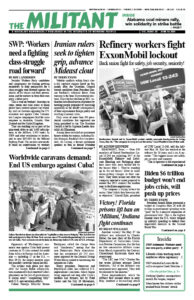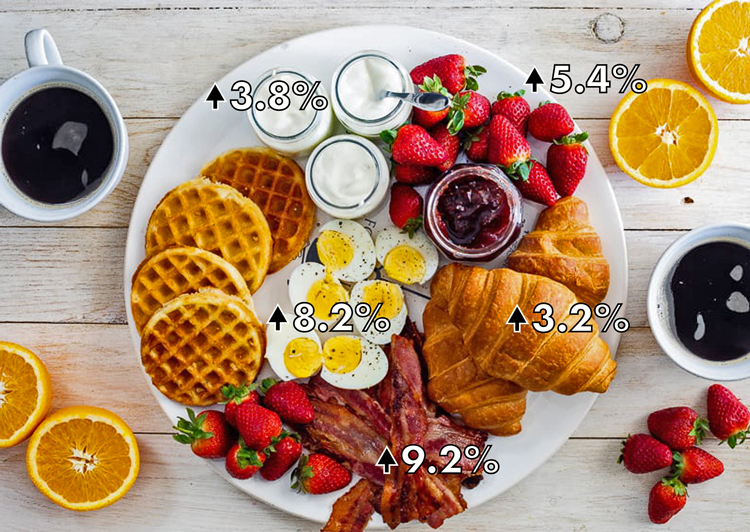President Joseph Biden presented a budget to Congress May 28 with $6 trillion in government spending to be “paid” for by a massive expansion of government debt. This is the highest amount since the U.S. rulers ramped up military spending to defend their imperialist interests in the Second World War.
Such bouts of government money printing frequently drive a sharp rise in inflation, coming on top of the mounting uncertainty working people face from persistent joblessness and recent price rises already biting into the living standard of working people.
Biden says this budget is necessary to fix broken infrastructure, end racist inequality, and curb greenhouse gas emissions while maintaining the U.S. rulers’ vast, worldwide military arsenal. Under this plan government debt as a percentage of gross domestic product will soar to 117% by 2031.
These budget priorities are liberal reforms aimed at giving the dog-eat-dog capitalist system a more human face — to try to convince workers to rely on government do-gooders to solve problems as opposed to organizing ourselves to use our class-struggle strength against the attacks and indignities of capitalist rule.
Biden’s plan includes big spending on continued growth of the government bureaucracy, agencies to “nudge” workers to behave as meritocratic regulators think we ought to. The so-called Health and Human Services agency would get a 23% increase, while spending at the Department of Commerce will go up 27%. And Biden’s plan doles out another round of generous largesse to the country’s bosses, who he promises will use it to hire some workers sometime in the future.
Republicans have countered with a $928 billion budget, which relies more heavily on incentives for private capital to drive the economy. Neither proposal offers working people any serious plan to provide jobs for the millions of unemployed workers today.
Deficit-spending policies led to double-digit inflation in the mid-1970s when the government ran larger and larger budgets to finance the U.S. rulers’ war in Vietnam. The government filled the gap by printing more money. This fueled inflationary pressures here and around the world. Under these kind of conditions workers face both shortages of basic necessities and see the real value of protections we’ve won like Social Security and whatever savings we’ve managed to scrimp together get slashed as prices skyrocket.
The scourge of rising prices
Prices for food items are surging already. This time last year bone-in ham cost $1.79 a pound, today it’s $7.67, the Department of Agriculture reports. Over the same period a dozen organic eggs rose from $3.10 to $4.99.
Janet Yellen, treasury secretary and former chair of the Federal Reserve Board, dismissed concerns that Biden’s budget would drive inflation. New York Times columnist and Nobel Prize winner Paul Krugman claimed the “burden of federal debt properly measured is minimal.” They and other liberals believe despite the evidence of past experience that the government can print money and spend whatever it wishes without any consequences. They claim today’s price rises are a result of lockdown-induced shortages and will soon disappear.
These officials have no sense of how even modest price hikes devastate workers, especially after millions of us have been subjected to wage and job cuts and demands for more at the hands of profit-hungry bosses.
At least 8 million more people are unemployed today than before the pandemic, while official inflation for the first quarter of this year rose at an annual rate of 5%. Even that measure hides the vastly different impact of rising prices on different classes. For example, the spiraling costs of food and gas are deemed “volatile” and not considered when the government describes “core inflation.”
Fight for jobs, counter price rises
“Without a fight by workers and our unions to put millions back to work, the working class will increasingly get torn apart,” Malcolm Jarrett, SWP candidate for mayor of Pittsburgh, told the Militant June 1. “We need to be on the job where we can fight against boss assaults on our wages and working conditions as well as the impact of rising prices.”
“The Socialist Workers Party urges a fight for a government-funded public works program to put millions back to work at union-scale wages to build the hospitals, houses, schools and other things we need,” he said.
Capitalist pundits frequently claim wage raises are the cause of inflation in an effort to deter working people from joining together and using union power to defend ourselves.
“Higher wages don’t lead to increased prices, they come out of the bosses’ profits,” Jarrett said. “Fighting for cost-of-living clauses in every union contract and in government benefit payments provides crucial protection for our wages whenever prices go up.”
Biden says his proposed huge expansion of government debt will eventually be paid for by revenue from tax hikes on the wealthy and their corporations. But capitalist bosses and bankers hire armies of accountants to ensure they pay as little tax as possible. If their taxes still rise after that, they’ll look for ways to foist those extra costs onto workers’ backs. They’ll try to impose more life-threatening speedup on the job and attack our wages.
While inflation ruins working people, some predatory investors on the stock market are anticipating they can take advantage of price hikes to get rich. Harley Bassman runs a hedge fund based on gambling that the Federal Reserve will eventually be forced to raise interest rates in an effort to try to lessen inflation, making investments in Treasury bonds especially lucrative.
“Working people need to rely on ourselves and build our own party, a labor party,” Jarrett said.
“Doing so would be a key step in organizing independently of the bosses and their parties — the parties of unemployment, inflation and war. A labor party would provide us with the fighting tool we need to lead millions in struggle to overturn the rule of the capitalist class and take political power into our own hands.”


